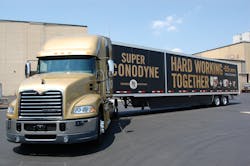Mack Trucks confident in market direction, product strategy
While orders in the U.S. – especially for Class 8 units – are undergoing “a longer than expected pause” due to several broad economic factors, the “trajectory is still upward” in terms of trucking industry fundamentals, according to John Walsh, vp-marketing for Mack Trucks Inc.
Speaking at trade press event host by Mack at its Macungie assembly plant and customer center, both located in Pennsylvania’s Lehigh Valley, Walsh stressed that the company “feels very good about where the industry is and where we are” not only in terms of future demand for trucks but also about how the mix of product enhancements Mack is rolling out fits the needs of fleets large and small.
“While we’re keeping a close eye on the [order] situation, as sluggish job growth in the U.S. and the sovereign debt crisis in Europe has the potential to dampen the [trucking] market, the level of replacement demand and high age of equipment are major positives,” he explained.
“We still see a strong year [for truck sales] for the industry and for Mack,” Walsh added. “We also believe we’ve never been in a better position for success than today.”
Part of that confidence stems from what Walsh called “a better balance” between Mack’s vocational and highway product offerings – making it more “diversified” so no one industrial segment, like construction, drives a majority of its truck order volume.
Another piece revolves around the rollout of the company’s new “Super Econodyne” fuel efficiency package for its Pinnacle line of highway tractors, as well as an “integrated” package of support services; both of which Mack formally introduced at the Mid America Trucking Show back in March.
David McKenna, Mack’s director of powertrain sales and marketing, explained that key aspect of the new “Super Econodyne” tractor package is its ability to deliver maximum fuel economy across a far wider range of road speeds than ever before – typically providing a 4% to 5% boost in fuel efficiency, according to road tests conducted with a variety of fleet customers.
[To watch McKenna provide some insight into the "Super Econodyne" spec during his presentation to reporters, please click here and here.]
He explained that by providing a completely integrated powertrain – an MP8 engine cranking out 445 hp and delivering up to 1,760 ft.-lbs. of torque; 12-sp. mDrive automated manual transmission (AMT); and C125 proprietary drive axles all tied together with new customized software – allows its Pinnacle “Super Econodyne” tractor to cruise at 62 mph at just 1,160 rpm without any loss of power or performance.
“What this does is allow us to not only optimize the ‘sweet spot’ for fuel economy but make the ‘sweet spot’ bigger,” McKenna said. “That means we can deliver maximum fuel economy at road speeds ranging from 50 mph to 80 mph – though we certainly do not encourage any fleet or operator to run at 80 mph.”
[Click here to view a photo gallery of the new "Super Econodyne" tractor spec.]
He also stressed that Mack is not charging a premium for the “Super Econodyne” spec right now – selling it a the same price of its Pinnacle Econodyne tractor spec to encourage Mack’s customer base see what fuel savings they can generate with it.
Walsh also pointed out that Mack’s new Pedigree Uptime Protection integrated package of customer support services – comprised of Bulldog Service Management, Bulldog Parts Purchasing and Bulldog Asset Protection – is now being enhanced with a new preventive maintenance option called Mack Complete Care, designed especially to help fleets meet the vehicle upkeep conditions outlined in the Federal Motor Carrier Safety Administration’s new Compliance, Safety and Accountability (CSA) program.
He added that the Complete Care service is available through all authorized Mack dealers in both the U.S. and Canada, is accessed via Mack’s OneCall service, and can be bundled into the price of a new Mack truck or purchased separately within the first nine months after delivery – with service plans of 36, 48 and 60 months available.
“This is part of our overall effort to allow our customers to focus more of their time and attention of fleet operations – where they make money,” Walsh explained. “It’s about us pulling together all the support services a customer might need under one umbrella so they don’t have to go to half a dozen different places and service providers to take care of their equipment.”
About the Author
Sean Kilcarr
Editor in Chief
Sean Kilcarr is a former longtime FleetOwner senior editor who wrote for the publication from 2000 to 2018. He served as editor-in-chief from 2017 to 2018.
